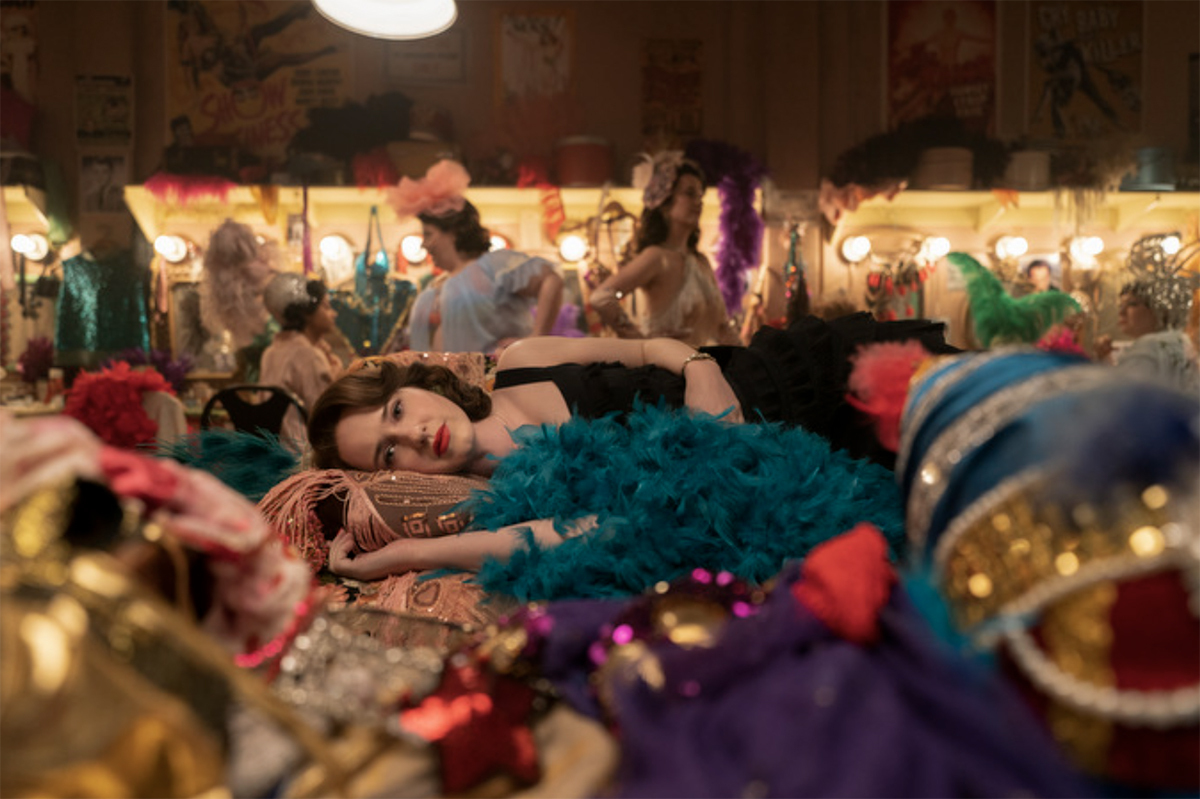Since its 2017 premiere, Amy Sherman-Palladino’s period comedy “The Marvelous Mrs. Maisel” has had a polarizing reception among Jewish viewers. The story of an affluent housewife (Rachel Brosnahan) who embarks on a career as stand-up comic after her husband leaves her, “Maisel” has received plaudits for the performances of its cast members, its highly stylized, whimsical costume and scenic design, and the quirky, fast-paced humor central to all Sherman-Palladino offerings (most notably “Gilmore Girls”). The characters’ Jewishness is integrated into their everyday lives; it comes out in their accents and mannerisms, their arguments over matchmaking, holidays and their treatment of Jewish converts. Yet some viewers have pushed back against the show’s brand of Jewishness, finding it a cheap imitation of real experiences.
These battles are sure to flare again as the fourth season of “Maisel,” much delayed due to COVID, begins on Friday, February 18. Though two years have passed since the show’s third season, only a few minutes have elapsed in the show’s 1960 setting: Midge and her manager Susie (Alex Borstein) have just been unceremoniously fired from the European leg of a tour with crooner Shy Baldwin (Leroy McClain) after Midge used her opening comedy set at Harlem’s Apollo Theater to rag on Baldwin’s sexuality, believing his gayness an open secret. Rather than reflect on the harm she has caused and the pain of a man she’d considered a friend, Midge doubles down on the rhetoric that’s fueled her fire so far: It’s a man’s world, and men will keep screwing her over until she takes a stand for herself. Though true in many facets of her life — her husband Joel (Michael Zegen, who remains compelling despite some baffling character development) uprooted her life with an affair, the comedy world is dominated by men of middling talent and she’ll soon learn that her credit history is null and void outside of her marriage — this reductive mode of thinking tastes even more sour in a post-2020 world.
For all her talents and virtues, Midge lives in a bubble, shocked by her own privileges and the realizations that not everyone lives a life identical to her. Despite her education, she doesn’t even understand why the Black members of Shy’s entourage have to stay in segregated facilities on tour. None of this criticism is new, but if “Maisel” viewers thought that the past two years of protests and policy changes targeting racial justice would seep into into a more well-rounded protagonist, they’d be mistaken — but likely not surprised, as Sherman-Palladino is more known for her insular worlds than for her nuanced takes on social issues. Like her other shows, “Maisel” is best taken with a spoonful of sugar and denial.
Though the first two episodes don’t hint at any overarching Jewish plots, the series still uses Jewish humor to round out the world of its characters. Some of it remains grating — Shirley (Caroline Aaron) as the embodiment of the stereotypical Jewish mother is still one of the most maddening roles now on TV — while other moments elicit both laughs and nods of recognition. Rose (Marin Hinkle), now working as a matchmaker, has a prolonged back-and-forth with her husband Abe (Tony Shalhoub, who remains pretty perfect) over whether the two were introduced by a family friend or a fellow matchmaker (they don’t use the Yiddish term, shadchan). Rose insists that, despite Abe’s obliviousness, the family friend was a matchmaker, and the revelation strikes Abe while the two are stranded in separate cars mid-air on Coney Island’s Wonder Wheel.
The best Jewish joke so far also highlights a major point of contention for the series and its fans. In the second episode, Midge, drunk and down on her luck, waits for her turn to take the stage as man after man delivers comedy sets inferior to hers. She laments the tired shtick of one “hack” comic’s bad Jewish jokes — the kinds of jokes your grandparents may tell, like, “A Gentile’s favorite wine is cabernet, a Jew’s favorite whine is, ‘It’s too cold in here.’” Midge repeats his jokes verbatim, loud enough to draw attention, before screeching, ‘Ha ha ha, I’m Jewish,” as if to sum up the comic’s whole act.
The jest is sure to be much-quoted by the show’s Jewish fans, and Brosnahan’s delivery is as sharp as always. But the moment is nevertheless awkward, as Brosnahan and the writers mock the tired Jewish humor their own show has relied on for years — a sense of humor so riddled with lackadaisical stereotypes that comedian Andy Samberg once described “Maisel” as “the show that makes audiences sit up and say, ‘Wait, is this antisemitic?’”
What does a show whose Jewish spirit doesn’t dig deeper than berating mothers, bad money jokes and black-and-white cookies hope to achieve by mocking its own footing in the TV comedy world, especially when critics still lament the casting of a non-Jewish actor in its title role?
Midge’s retort encapsulates the main problem with “Maisel”: Five years later, the show still hasn’t found its footing, unsure if it wants to be a lighthearted, nostalgia-tinged comedy known for aesthetics over substance or a hard-hitting commentary on what it means to be an American woman. The hint at the end of the second episode that Midge may emcee a burlesque club is a perfect development to this end, not only because the career move fits the character, but because it shows how “Maisel” and Sherman-Palladino are never quite saying what they think they’re saying: Midge can avoid competing with men by taking a job that caters to men, just like the show can continue placating non-Jewish audiences with humor that, though dressed to the nines, is uninspired.



